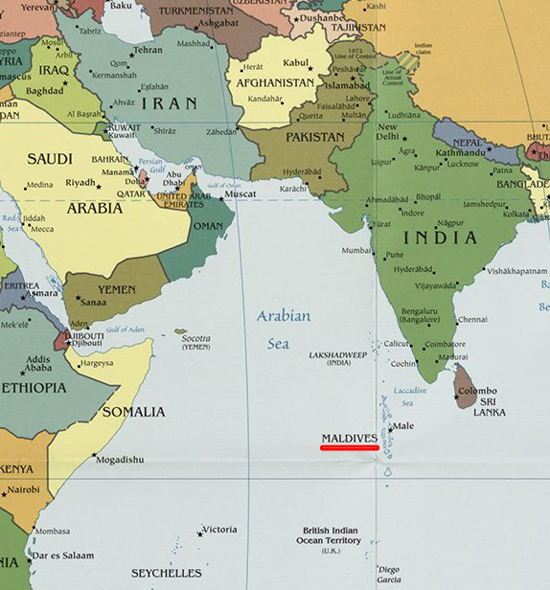Maldive Islands
Area 115 square mi (300 square km)
Population 357,400 2014
Capital Male
Highest Point 7.8 ft (2.4 m)
Lowest Point 0 m
GDP $3.032 billion 2014
Primary Natural Resources coconuts, corn, sweet potatoes, fish, tourism.
THE COUNTRY OF THE Maldive Islands is located in southern Asia, in the INDIAN OCEAN, as a group of atolls south-southwest of INDIA. This remote island nation is comprised of 1,191 coral islands amid major shipping routes in the Indian Ocean. Archaeological evidence of settlement from South Asia is datable to around 500 B.C.E. The native language of Dhivehi points to Sri Lanka as the source of the Maldives' earliest continuous cultural roots. The details of the conversion of the Buddhist king to Islam is wrapped in legend but venerated as the key point of the islands' history. In 1153, the king adopted Islam and thereupon the title of Sultan Muhammad al Adil. This initiated a series of six dynasties consisting of 84 sultans and sultanas that lasted until 1932, when the sultanate became elective.

For the vast bulk of its sultanate history, the Maldives remained independent. Only in the 16th century did the Portuguese first come upon the Maldives in pursuit of the spice trade. In 1558, the Portuguese invaded Male only to be ejected 15 years later. The vying colonial powers continued to supplant one another. In the mid-17th century, the Dutch controlled the spice trade but put no colonial government in the Maldives. The British moved the Dutch aside, and by 1887, it officially made Maldives a British protectorate, leaving internal affairs to be managed by the sultan.
During the 1950s, British military activity dominated Maldivian economics and politics. In 1956, the British gained license to reestablish its wartime airfield on Gan Island at very concessionary terms. Newly elected Prime Minister Ibrahim Nasir questioned this agreement and called for official review. Peoples of the southern atolls and leaders who benefited most from the British presence started a secessionist movement to establish an independent state. In 1962, Nasir sent government police to successfully suppress this insurrection. Nasir also renegotiated the terms of the lease of the airfield at Gan.
On July 26, 1965, the Maldives gained independence from Britain. Three years later they voted to abolish the sultanate and established a republic. Ibrahim Nasir dominated politics for the next 10 years until he fled the country for SINGAPORE, taking more than his share of the nation's wealth.
Economic downturns in the fishing industry and the British decision to close the airbase on Gan in 1975 were great a challenges for the government. A former college lecturer and ambassador, Maumoon Abdul Gayoom was elected president in Nasir's place. Gayoom has been in power since 1978, surviving three coup attempts and remaining popular with the Maldive people.
Recent years have seen continuing economic growth and modernization. This growth has been primarily in the tourist industry with profits going to improve other sectors as well. The Maldives have been the recipient of generous and consistent foreign aid. There remains a tension between the progressive nature of the tourist industry and the conservative tone of a traditional Muslim way of life. Sustained use of the marine resources in the tourist and fishing industry are a continuing challenge.